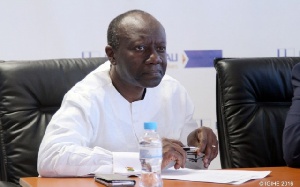 Ken Ofori-Atta, Minister of Finance
Ken Ofori-Atta, Minister of Finance
Government has lamented the level at which the country’s economy is recording more expenditure than revenue saying such a trend has over the years succeeded in robbing the country of critical development in most sectors of the economy.
Speaking at the opening of the ongoing National Policy Summit yesterday in Accra, Ken Ofori-Atta, Minister of Finance, did not mince words: “We are spending more than we are generating and borrowing to finance those expenditures. Over the years, revenue generation has become stagnant due to many factors. In the meantime, we earmarked significant portion of the revenues. Added to that is an increasing expenditure especially in wages and salaries and interest payments.”
The Finance Minister continued that “this situation led to very limited investment in the critical sectors of the economy, the provision of needed infrastructure and investment in the real sector to generate and facilitate economic activity and create opportunities for people. What we saw was a persistent and consistent decline in economic activity and increased unemployment.”
Effects
Mr Ofori-Atta said the impact of such a situation was high inflation; high and unstable exchange rates, high interest rate as well as short, scarce and expensive credit for private sector to invest. He added that the situation was further compounded by poor service delivery and complex and unfriendly regulatory requirement with regards to business licensing and granting of permits adding that led to a loss of confidence by investors and private sector.
Gov’t determination
He said government was determined to change this narrative by working around some 5 key pillars. These include increasing revenue, controlling expenditure, ensuring sustainable debt, efficient wage management and capping earmarking funds.
Evidence already showing
With the ‘Asempa’ Budget, he said Government had changed the composition of expenditures, reduced wage as a percentage of public spending, and also interest payment as a percentage of public spending as well as increased capital spending to provide critical infrastructure like energy and transportation, among others.
“The results of such above noted measures are already showing and these include a stable exchange rate, reducing inflation, reducing interest rates, savings from debt profiling, increased credit to private sector and a renewed confidence by private sector and investors.”
New industrial parks
Alan Kwadwo Kyerematen, Minister for Trade & Industry, also in a speech, said Government has planned to anchor industrialization in the country with the establishment of some ten new industrial parks.
He said each of the ten regions would have one park with the requisite facilities and flexible land schemes to facilitate the establishment of industries.
Noting that such initiative drew heavily on similar models from Asia, he said it was expected to create thousands of jobs for Ghanaians.
“It takes us to the next component of our transformation agenda which is to establish at least one major industrial park in each of the ten regions. If we are talking about enhancement of industrial production then obviously access to lands and energy must be a critical factor. That is why these industrial parks are actually important. The magic of Asia, China Korea are all about the establishment of industrial parks and special economic zones.
Export development
“We are actually going to aggressively promote export development because if you produce, you should be able to sell.”
He added that although the country had quite a noteworthy market, that was limited “so we want to aggressively promote exports to take advantage of the enhanced production that is coming up.”